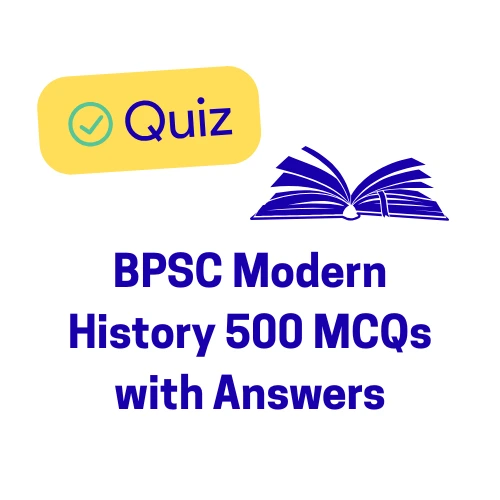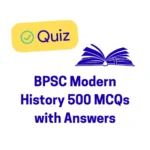BPSC Modern History Part 12 (500 MCQs) focus on the Communal Award, Poona Pact, Government of India Act (1935), Congress Ministries, and the rise of Subhas Chandra Bose (1932-1939).
BPSC Modern History Part 12 (500 MCQs)
Section DD: Communal Award and Poona Pact
Q331. The Communal Award was announced in August 1932 by the British Prime Minister:
(A) Winston Churchill
(B) Neville Chamberlain
(C) Ramsay MacDonald
(D) Clement Attlee
Q332. The Communal Award extended the principle of separate electorates to which groups, in addition to Muslims and Sikhs?
(A) Christians and Anglo-Indians
(B) Depressed Classes (Scheduled Castes)
(C) Buddhists and Jains
(D) Landlords and Laborers
Q333. Mahatma Gandhi undertook a fast unto death in Yerwada Jail to protest against which specific provision of the Communal Award?
(A) Separate electorates for Muslims.
(B) Separate electorates for the Depressed Classes.
(C) Exclusion of the Princely States from the proposed federation.
(D) Limited voting rights for Indians.
Q334. The Poona Pact (1932) was an agreement signed between Mahatma Gandhi and which other prominent leader?
(A) Muhammad Ali Jinnah
(B) Dr. B. R. Ambedkar
(C) C. Rajagopalachari
(D) Tej Bahadur Sapru
Q335. What was the core feature of the agreement reached under the Poona Pact?
(A) The Depressed Classes gave up the demand for separate electorates but were granted a greater number of reserved seats in the legislatures.
(B) The Depressed Classes retained separate electorates and were also granted reserved seats.
(C) The Depressed Classes gave up all claims for reserved seats.
(D) The Communal Award was completely withdrawn by the British.
BPSC Modern History Part 12 (500 MCQs)
Q336. After the Poona Pact, Mahatma Gandhi dedicated himself to the cause of the Depressed Classes, referring to them as:
(A) Dalit
(B) Scheduled Caste
(C) Harijan (Children of God)
(D) Backward Classes
Q337. Mahatma Gandhi started the Harijan Sevak Sangh in 1932. Who was its first President?
(A) Dr. B. R. Ambedkar
(B) G. D. Birla
(C) Jamnalal Bajaj
(D) Rajendra Prasad
Q338. The INC session which saw the official end of the Civil Disobedience Movement was held in:
(A) Lahore (1929)
(B) Karachi (1931)
(C) Bombay (1934)
(D) Lucknow (1936)
Q339. The ideology of Socialism was formally accepted and promoted by the Congress at the 1936 Lucknow Session, which was presided over by:
(A) Mahatma Gandhi
(B) Subhas Chandra Bose
(C) Jawaharlal Nehru
(D) Sardar Vallabhbhai Patel
Q340. The Congress Socialist Party (CSP), an influential left-wing group within the INC, was founded in 1934 by:
(A) M. N. Roy and Jawaharlal Nehru
(B) Acharya Narendra Dev and Jayaprakash Narayan
(C) S. A. Dange and Muzaffar Ahmad
(D) Subhas Chandra Bose and P. C. Joshi
Section EE: Government of India Act, 1935 and Provincial Elections
Q341. The Government of India Act, 1935 provided for which of the following?
An All India Federation (never came into effect).
Provincial Autonomy.
Abolition of Diarchy at the provincial level and its introduction at the Centre.
(A) 1 and 2 only
(B) 2 and 3 only
(C) 1 and 3 only
(D) 1, 2, and 3
Q342. Which key constitutional principle was introduced at the provincial level by the Government of India Act, 1935?
(A) Responsible Government
(B) Separate Electorates for all minorities
(C) Purna Swaraj
(D) Indirect election
Q343. The Act of 1935 provided for a Federal Court in India. This court was established in which year?
(A) 1935
(B) 1937
(C) 1939
(D) 1947
Q344. Which prominent Indian leader described the Government of India Act, 1935 as a “machine with strong brakes but no engine”?
(A) Mahatma Gandhi
(B) Subhas Chandra Bose
(C) Jawaharlal Nehru
(D) Dr. B. R. Ambedkar
Q345. Provincial elections under the Government of India Act, 1935 were held in which year?
(A) 1935
(B) 1936
(C) 1937
(D) 1938
BPSC Modern History Part 12 (500 MCQs)
Q346. In the 1937 provincial elections, the Indian National Congress won an absolute majority in how many provinces?
(A) 3
(B) 5
(C) 7
(D) 9
Q347. The Congress formed a government either alone or in coalition in a total of how many provinces after the 1937 elections?
(A) 5
(B) 7
(C) 8
(D) 11
Q348. The Muslim League failed to secure a majority in any of the Muslim-majority provinces in the 1937 elections. Which Muslim-majority province was not ruled by a coalition that excluded the Muslim League?
(A) Bengal
(B) Punjab
(C) Sindh
(D) North-West Frontier Province (NWFP)
Q349. The Congress Ministries resigned in October 1939. This resignation was primarily a protest against:
(A) The British refusal to grant Dominion Status.
(B) The British decision to unilaterally drag India into World War II without consulting the Indian leadership.
(C) The implementation of the Communal Award.
(D) The failure of the British to introduce full provincial autonomy.
Q350. The Muslim League celebrated the resignation of the Congress Ministries in 1939 as the:
(A) Pakistan Day
(B) Direct Action Day
(C) Day of Deliverance
(D) Day of Salvation
Section FF: Subhas Chandra Bose and WWII Beginning
Q351. Subhas Chandra Bose was twice elected as the President of the Indian National Congress. These two sessions were:
(A) Lahore (1929) and Karachi (1931)
(B) Lucknow (1936) and Haripura (1938)
(C) Haripura (1938) and Tripuri (1939)
(D) Haripura (1938) and Ramgarh (1940)
Q352. Subhas Chandra Bose defeated which candidate of Mahatma Gandhi in the crucial election for the Presidency of the Tripuri Session, 1939?
(A) Maulana Abul Kalam Azad
(B) Dr. Rajendra Prasad
(C) Pattabhi Sitaramayya
(D) Jawaharlal Nehru
Q353. Due to differences with the Congress Working Committee and Mahatma Gandhi, Subhas Chandra Bose resigned from the INC Presidency in 1939 and founded a new political party called the:
(A) Forward Bloc
(B) Azad Hind Fauj
(C) Revolutionary Communist Party
(D) Indian Independence League
Q354. Subhas Chandra Bose strongly advocated for which of the following policy towards the British during the period of World War II?
(A) Full cooperation with the British to defeat Fascism.
(B) Neutrality and non-involvement in the war.
(C) Exploiting the war situation to launch an immediate and aggressive struggle for independence.
(D) Seeking Dominion Status after the war’s conclusion.
Q355. Which prominent leader was chosen by Mahatma Gandhi and the Congress to fill the vacant Presidential post after the resignation of Subhas Chandra Bose in 1939?
(A) Jawaharlal Nehru
(B) Dr. Rajendra Prasad
(C) C. Rajagopalachari
(D) Abul Kalam Azad
BPSC Modern History Part 12 (500 MCQs)
Q356. The first INC session to be held in a village instead of a town was the:
(A) Lucknow Session, 1936
(B) Faizpur Session, 1937
(C) Haripura Session, 1938
(D) Tripuri Session, 1939
Q357. The Congress Ministries that resigned in 1939 had been in office for approximately:
(A) 18 months
(B) 28 months
(C) 48 months
(D) 60 months
Q358. Which two provinces had non-Congress ministries in 1939 at the time of the Congress Ministries’ resignation?
(A) Bihar and Orissa
(B) Madras and Bombay
(C) Bengal and Punjab
(D) UP and Central Provinces
Q359. The Karachi Session of INC (1931), presided over by Sardar Vallabhbhai Patel, is significant for adopting which two major resolutions?
(A) Purna Swaraj and Salt Satyagraha
(B) Resolution on Fundamental Rights and National Economic Programme
(C) Non-Cooperation and Khilafat
(D) Quit India and Individual Satyagraha
Q360. Who was the Viceroy of India when World War II broke out in 1939?
(A) Lord Irwin
(B) Lord Willingdon
(C) Lord Linlithgow
(D) Lord Wavell

